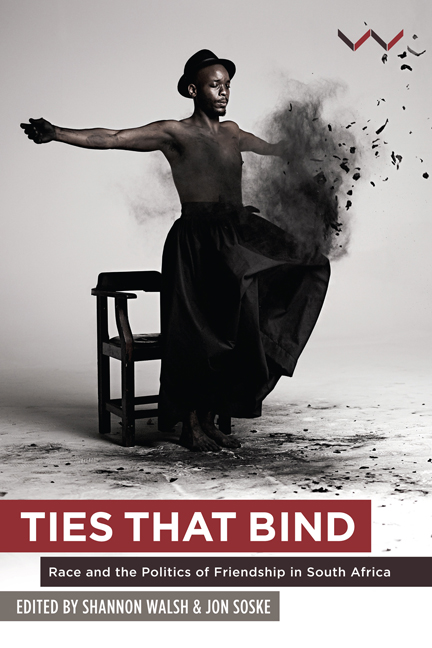Book contents
- Frontmatter
- Contents
- List of Figures
- Epigraph
- Fanon's Secret
- 1 Thinking About Race and Friendship in South Africa
- 2 With Friends Like These: The Politics of Friendship in Post-Apartheid South Africa
- 3 Bound to Violence: Scratching Beginnings and Endings with Lesego Rampolokeng
- 4 Afro-Pessimism and Friendship in South Africa: An Interview with Frank B. Wilderson III
- 5 The Impossible Handshake: The Fault Lines of Friendship in Colonial Natal, 1850-1910
- 6 The Problem With ‘we’: Affiliation, political Economy, and the Counterhistory of Nonracialism
- 7 Affect and the state: Precarious Workers, The Law, and the Promise of Friendship
- 8 ‘A Song of Seeing’: Art and friendship Under Apartheid
- 9 ‘Friend of the Family’: Maids, Madams, and Domestic Cartographies of Power in South African Art
- 10 Corner Loving: Ways of Speaking about Love
- 11 Kutamba Naye: In Search of Anti-Racist and Queer Solidarities
- 12 The Native Informant Speaks Back to The Offer of Friendship in White Academia
- Acknowledgments
- Contributor Biographies
- Index
5 - The Impossible Handshake: The Fault Lines of Friendship in Colonial Natal, 1850-1910
Published online by Cambridge University Press: 21 April 2018
- Frontmatter
- Contents
- List of Figures
- Epigraph
- Fanon's Secret
- 1 Thinking About Race and Friendship in South Africa
- 2 With Friends Like These: The Politics of Friendship in Post-Apartheid South Africa
- 3 Bound to Violence: Scratching Beginnings and Endings with Lesego Rampolokeng
- 4 Afro-Pessimism and Friendship in South Africa: An Interview with Frank B. Wilderson III
- 5 The Impossible Handshake: The Fault Lines of Friendship in Colonial Natal, 1850-1910
- 6 The Problem With ‘we’: Affiliation, political Economy, and the Counterhistory of Nonracialism
- 7 Affect and the state: Precarious Workers, The Law, and the Promise of Friendship
- 8 ‘A Song of Seeing’: Art and friendship Under Apartheid
- 9 ‘Friend of the Family’: Maids, Madams, and Domestic Cartographies of Power in South African Art
- 10 Corner Loving: Ways of Speaking about Love
- 11 Kutamba Naye: In Search of Anti-Racist and Queer Solidarities
- 12 The Native Informant Speaks Back to The Offer of Friendship in White Academia
- Acknowledgments
- Contributor Biographies
- Index
Summary
In 1854, John Colenso, the newly appointed Bishop of Natal, arrived in the colony on a preliminary tour. After meeting many of the settler families and colonial administrators, Colenso looked forward to meeting indigenous Africans, with whom he hoped to build productive and close, lasting relationships. During one of his first encounters with a Natal African, however, Colenso (1855: 45) remembered that settler administrators (even those ostensibly self-designated as ‘philo-Kafirs’ or liberal-minded on racial divisions) had instructed him on the parameters of colonial friendship with indigenous peoples. He recalled:
With all my heart [I] would have grasped the great black hand, and given it a good brotherly shake: but my dignity would have been essentially compromised in his own eyes by any such proceeding. I confess it went very much against the grain; but the advice of all true Philo-Kafirs, Mr. Shepstone among the rest, was to the same effect―viz that too ready familiarity, and especially shaking hands with them upon slight acquaintance, was not only not understood by them, but did great mischief in making them pert and presuming. Accordingly, I looked aside with a grand indifference as long as I could, (which was not very long,) and talked to Mr. G., instead of paying attention to the Kafir's presence.
At such an early point in the colony's history, the limits of sociability and friendship had already become clear in the minds of settler administrators. The logics of colonial rule in Natal required an effective division between the ‘African’ subject and the ‘proper’ settler; these divisions were to be further entrenched politically and legally through the implementation of customary law for Africans and civil law for European colonists. This moment of unrealized friendship provides a profound and intriguing site of rupture in the colonial record. From Colenso's intimation of the perspective of Mr. Shepstone, and the other ‘philo-Kafirs’, we can presume that the hierarchized distinctions between African and European were to be understood as a paternalistic form of love. Yet Colenso's shake was not a paternalistic or hierarchal form of ‘love’ for the African; rather, he imagined his gesture as a magnanimous, or brotherly act of friendship.
- Type
- Chapter
- Information
- Ties that BindRace and the Politics of Friendship in South Africa, pp. 100 - 124Publisher: Wits University PressPrint publication year: 2016



